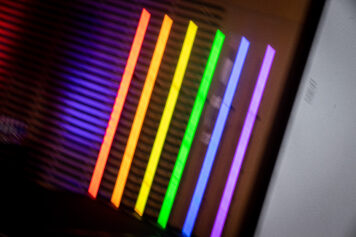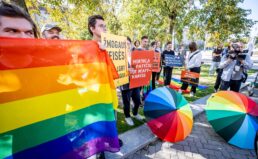Moonlight has made Oscars history as the first gay-themed film to win Best Picture and was a win for LGBTI people of colour everywhere.
In what is set to become arguably the most memorable moment in an Academy Awards ceremony ever, Moonlight won Best Picture after it was mistakenly announced as La La Land.
On the 50th anniversary of Bonnie and Clyde, actors Warren Beatty and Faye Dunaway were the presenters for the show’s last award.
There had been a lot of speculation around whether La La Land or Moonlight would take the top Oscar.
Many argued it should be Moonlight for its portrayal of a black gay boy living in the Miami projects, a voice that’s rarely heard in mainstream film.
In what the audience thought was Beatty trying to be funny after he opened the award, he checked the envelope twice and hesitated for a while before announcing La La Land as the winner.
During the producer’s acceptance speech a stage hand ran onto the stage to check the envelopes.
La La Land producer Jordan Horowitz then announced Moonlight had won the Oscar and invited them onto the stage.
It took a while for the confusion to settle down before the Moonlight team – who could not believe they had won – stepped on stage.
Host Jimmy Kimmel stepped in to confirm the mix-up and Beatty soon followed to explain what had happened.
‘I want to tell you what happened,’ he said.
‘I opened the envelope and it said Emma Stone, La La Land. That’s why I took such a long look at Faye [Dunaway] and at you. I wasn’t trying to be funny.’
The Moonlight team took a moment to compose themselves and began their acceptance speeches.
Director Barry Jenkins said he could not believe what had just happened.
‘Very clearly, very clearly, even in my dreams, this could not be true,’ he said onstage.
‘But to hell with dreams, I’m done with it, because this is true.’
Moonlight wins three Academy Awards
Moonlight also picked up the Oscars for Actor in a Supporting Role and Best Adapted Screenplay.
In their acceptance speech writers Barry Jenkins and Tarell Alvin McCraney spoke about where they grew up in Miami, the same place the film is based on.
‘Two boys from Liberty City up here representing 305 — this goes out to all those black and brown boys and girls and non-gender conforming who don’t see themselves, we are trying to show you, you and us, so thank you, thank you, this is for you,’ McCraney said.
Jenkins said he really wanted to win because he wanted to let people know they were being represented.
‘You know, I, told my students that I teach sometimes be in love with the process, not the result, but I really wanted this result because a bajillion people were watching,’ he said.
‘And for all you people out there who feel there is no mirror for you, that you feel your life is not reflected, the Academy has your back, the ACLU has your back, we have your back, and for the next four years we will not leave you alone, we will not forget you.’




